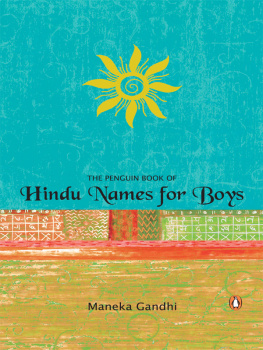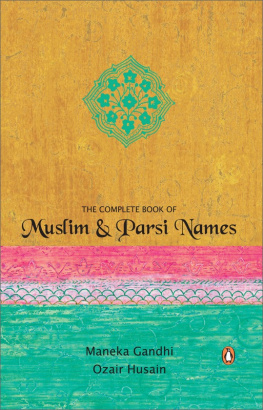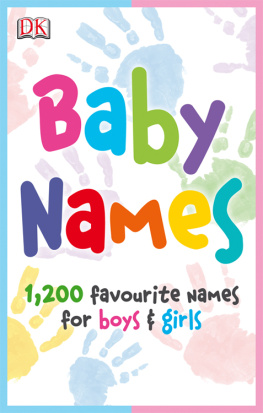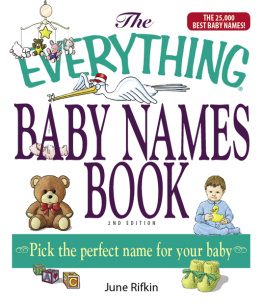MANEKA GANDHI
The Penguin Book of Hindu Names for Boys

PENGUIN BOOKS
PENGUIN BOOKS
UK | Canada | Ireland | Australia
New Zealand | India | South Africa
Penguin Books is part of the Penguin Random House group of companies whose addresses can be found at global.penguinrandomhouse.com.
This collection published 2004
Copyright Maneka Gandhi, 2004
The moral right of the author has been asserted
Jacket images Kavita C. Dixit
ISBN: 978-0-143-03168-0
This digital edition published in 2016.
e-ISBN: 978-8-184-75836-8
This book is sold subject to the condition that it shall not, by way of trade or otherwise, be lent, resold, hired out, or otherwise circulated without the publishers prior consent in any form of binding or cover other than that in which it is published and without a similar condition including this condition being imposed on the subsequent purchaser.
PENGUIN BOOKS
THE PENGUIN BOOK OF HINDU NAMES FOR BOYS
Maneka Gandhi was born on 26 August 1956 and was educated at Lawrence School, Sanawar. She was a magazine editor and columnist before she embarked on a career in politics. She was elected to Parliament in November 1989 and was later appointed Minister of State for Environment and Forests, a post she held till June 1991.
Maneka Gandhi has written three books, Sanjay Gandhi, Brahmas Hair (a book on the mythology of Indian plants) and Boulababa. Her special interests include Indian mythology, animal welfare (she is the Managing Trustee of the Ruth Cowell Foundation, which runs the Sanjay Gandhi Animal Welfare Centre, Indias largest animal hospital and shelter) and issues related to environmental conservation.
She lives in Delhi with her son, Feroze Varun.
To Aaryaman, the reason for this book
Guide to the Use of the Book
How to Read an Entry
1. All Sanskrit words are marked (S).
2. Genders are differentiated as follows(M) denotes male.
3. The definition of each name is listed in a numbered sequence in the following order: the subdivision marked 1 gives the literal meaning; 2 is the implied or intended meaning and 3 places the name in its specific mythological/literary/botanical context. Some entries do not feature all the subdivisions as these are not required.
4. All books and scriptures referred to in abbreviated form in the entries are expanded in full at the end of the book.
Pronunciation
father |
eagle/police |
rude |
merrily |
king |
chick |
h | chhota |
singe |
tomato |
h | anthill |
drum |
h | redhaied |
none |
sure |
shun |
or | nasal sound |
Introduction
This book started with the realization that I did not know the meaning of my name. All I knew was that Menaka (I spell it Maneka) was the name of an apsara in the court of Indra. No one I had encountered knew the meaning of their names either. Like me, they had been named after historical or mythological people. I hunted for a book, but while the libraries are full of information about the gods, I did not come across one book in India which gave the meaning of the name. What does Sarasvati mean? No, not learning even though she is the goddess of that, but full of water. Chandrashekhar does not mean Shiva but one who bears the moon on his forehead. I waited for someone to write a book but the two that emerged listed Menaka as apsara. When my sister announced that a baby was on the way, I decided to compile the dictionary myself.
The Vedic rishis believed that the name defined the childs character--its face, figure, temper, morals, tastes and profession. The name Anamika or without a name for instance, would ensure that the childs future was what she wanted to make it--since she was not hedged in by any preordained limitations. Most of us look for phonetically pleasing names without realizing their significance. But Minna means fat and Ambika means little mother, Sita means furrow, Mina means fish and Draupadi has no meaning other than daughter of Drupada. A number of names which are very common do not have any meaning at all. Anita, Lina, Rina and Tina for instance, come from languages other than Indian. If Roma is of Indian origin it means hairy! The Phul, Sona and Pyar family (Phulvati, Phulrani, Sonalika, Soriam, Pyari) have no roots in Sanskrit, Pali or any of the classical Indian languages. Rishma and Rashmini simply do not exist. Malvika is a combination name that has no meaning. (There is however a plant of the Ipomoea family called Malvika.) My mothers name Amteshwar is a corruption of, I think, Amritesvara or lord of the amrita. Alternatively it has no meaning at all Names like Bina are distortions of Vina (the musical instrument), Bihari is not from Bihar, for instance, but from Vihari or roamer. I have left out the local versions of the classical name (Poonam comes from Purnima, Rakhi from Rakshaka, for instance) or the local diminutives or corruptions (e.g. Lacchman or Lakha for Lakshman, Upinder for Upendra, Vanti for Vati). The only exception I have made is for Rima which is a corruption of Hrim--since this happened to be my copy editors name!
A lot of the names in India are combination names. Two primary names (usually of two gods or of a god and goddess) taken and made into one. For instance Ramakrishna or Radheshyam and in some cases, the conjoining of two gods produces an entirely new deity. I have tried to give as many combinations as possible, especially where there is a historical or mythological person with that compound. However the compounds can be infinite--and a lot of distortion of the primary names takes place in the mixture. Punjab is full of Gurveens, Tarveens, Harleens, Hargurbirinders and Harkirats. Some combinations are unique to certain regions in the country. The suffixes of Jit, Mita and Inder/Indra to the main name are usually from Punjab, Haryana and Rajasthan. Swamy, Appa, Amma show Tamil Nadu and Karnataka. The nagas or serpents who formed such an integral part of pre-Vedic and Vedic mythology are now confined to south and east India--e.g. Seshan, Nagabhushan, Phenamani. Even Manasa, the goddess of serpents, is a name far more common in Bengal than anywhere else in India.
The entries in this dictionary have been designed so that each entry is divided into three categories:
1. The exact or literal meaning. For instance Menaka means daughter of Mena.
2. The intended meaning or rather, the meaning of the meaning. Menakas intended meaning is of the mountains because, in Indian mythology, Mena is the consort of Himavan who is the lord of the Himalayas.
3. This is divided into two sub-categories. The first is the locating of the name in mythology, history, literature, botany or ornithology. If the name denotes a person out of mythology, history or literature I have tried to give the name of the mythological consort, the children and the name of the dynasty, as well as the names of Sanskrit Vedic commentators, grammarians and playwrights. I have included the names that come from plants, trees, birds and animals along with their Latin and English names.













